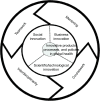Kuskaya: a training program for collaboration and innovation in global health
- PMID: 30643417
- PMCID: PMC6311319
- DOI: 10.2147/JMDH.S173165
Kuskaya: a training program for collaboration and innovation in global health
Abstract
To solve increasingly complex global health problems, health professionals must collaborate with professionals in non-health-related fields. The Universidad Peruana Cayetano Heredia and University of Washington created the NIH-funded Kuskaya training program in response to the need for transformative global health training for talented graduates from all disciplines. Kuskaya is a 1-year, interdisciplinary training program that teaches Peruvian and US graduates critical skills related to public health research through the design and implementation of a collaborative research project in Peru. Between 2014 and 2018, the program has trained 33 fellows, of which one third were from non-health disciplines. The program is unique because it targets junior trainees from disciplines outside of the health field, the program's curriculum is adapted to fit the fellows' backgrounds and professional aspirations, and the structure of the program allows for collaboration within the cohort and encourages fellows to apply for additional funding and pursue advanced degrees. Lessons learned in designing the Kuskaya program include: 1) involving mentors in the fellow selection process, 2) involving fellows in existing lines of research to increase mentor involvement, 3) institutionalizing mentoring through regular works-in-progress meetings and providing mentoring materials, and 4) defining a core curriculum for all fellows while providing additional supplementary materials to meet each cohort's needs, and evaluating their progress. Kuskaya provides an innovative model for bi-national, global health training to engage and provide a public health career pathway for all professionals.
Keywords: education; international health; program design; public health.
Conflict of interest statement
Disclosure The authors report no conflicts of interest in this work.
Figures


Similar articles
-
Developing capacity in health informatics in a resource poor setting: lessons from Peru.Hum Resour Health. 2009 Oct 27;7:80. doi: 10.1186/1478-4491-7-80. Hum Resour Health. 2009. PMID: 19860918 Free PMC article.
-
Management training in global health education: a Health Innovation Fellowship training program to bring healthcare to low-income communities in Central America.Glob Health Action. 2018;11(1):1408359. doi: 10.1080/16549716.2017.1408359. Glob Health Action. 2018. PMID: 29320943 Free PMC article.
-
Training the Workforce: Description of a Longitudinal Interdisciplinary Education and Mentoring Program in Palliative Care.J Pain Symptom Manage. 2017 Apr;53(4):728-737. doi: 10.1016/j.jpainsymman.2016.11.009. Epub 2017 Jan 3. J Pain Symptom Manage. 2017. PMID: 28062351
-
Innovative strategic Canadian research training from TomorrOw's Research Cardiovascular Health Care Professionals (TORCH).Clin Invest Med. 2004 Feb;27(1):33-41. Clin Invest Med. 2004. PMID: 15061584 Review.
-
MENTOR-VIP: Piloting a global mentoring program for injury and violence prevention.Acad Med. 2009 Jun;84(6):793-6. doi: 10.1097/ACM.0b013e3181a407b8. Acad Med. 2009. PMID: 19474562 Review.
Cited by
-
Building Capacity and Training for Digital Health: Challenges and Opportunities in Latin America.J Med Internet Res. 2019 Dec 18;21(12):e16513. doi: 10.2196/16513. J Med Internet Res. 2019. PMID: 31850849 Free PMC article.
-
Experiential Learning and Mentorship in Global Health Leadership Programs: Capturing Lessons from Across the Globe.Ann Glob Health. 2021 Jul 12;87(1):61. doi: 10.5334/aogh.3194. eCollection 2021. Ann Glob Health. 2021. PMID: 34307064 Free PMC article.
-
Multi-, Inter-, and Transdisciplinarity within the Public Health Workforce: A Scoping Review to Assess Definitions and Applications of Concepts.Int J Environ Res Public Health. 2022 Sep 1;19(17):10902. doi: 10.3390/ijerph191710902. Int J Environ Res Public Health. 2022. PMID: 36078616 Free PMC article.
-
Using the Kolb's experiential learning cycle to explore the extent of application of one health competencies to solving global health challenges; a tracer study among AFROHUN-Uganda alumni.Global Health. 2022 May 12;18(1):49. doi: 10.1186/s12992-022-00841-5. Global Health. 2022. PMID: 35550588 Free PMC article.
References
-
- Daar AS, Singer PA, Persad DL, et al. Grand challenges in chronic non-communicable diseases. Nature. 2007;450(7169):494–496. - PubMed
-
- Rittel HWJ, Webber MM. Dilemmas in a general theory of planning. Policy Sci. 1973;4(2):155–169.
-
- Conklin J. Wicked problems and social complexity. In: Conklin J, editor. Dialogue Mapping: Building Shared Understanding of Wicked Problems. Chichester: John Wiley & Sons Ltd; 2006. pp. 3–40.
LinkOut - more resources
Full Text Sources

